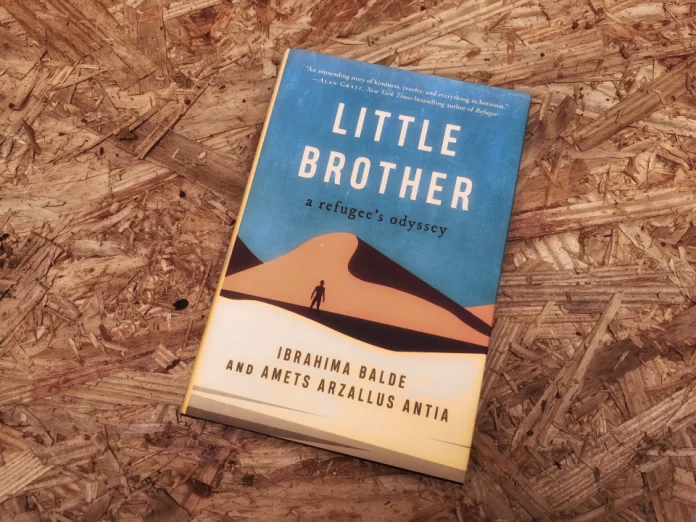Little Brother: A Refugee’s Odyssey is a retelling of the true, heartbreaking story of an African man in search of his younger brother.
Little Brother: A Refugee’s Odyssey (Arcade, 2021), a book tells the story of a man who has never been heard of, never known. This is not just his story; The story of one of the many refugees to tell! As the name suggests it is the story of a refugee; No, it is not a story, but it’s life.
Ibrahima Balde is a refugee, one of millions of people who have migrated from their own countries to seek asylum elsewhere. A person we don’t know. But if we spend some time with him, we can never forget him. You can read Balde’s account of his harrowing journey from Guinea to Europe.
Balde tells his story to a Basque poet, Amets Arzallus Antia, who then “retells” in novel form Little Brother: A Refugee’s Odyssey. Balde and Antia are credited as co-authors of the book. Ibrahima begins his life in the capital of Guinea, an African nation that shares borders with several countries, including Mali and Liberia.
In Search of his Brother
Tragedy struck Ibrahima early in life with the death of his father. The entire responsibility of the family fell on Ibrahima’s shoulders. Ibrahima, a teenager, takes this responsibility very seriously. He is already trying to provide for her mother and three siblings in nearby Liberia. Ibrahima’s life as a refugee begins when his younger brother sets out on his own to make life miserable. Ibrahima decided to find his lost younger brother and bring him home.
In his search for his brother, Ibrahima describes the many ways in which human life is devalued as a refugee. From being sold into slavery and being trapped in a chicken shack, to the moment he had to pull a tooth on the cord of an old carpet, to the moment his entire face swelled up without treatment, Ibrahima’s life in those days was nothing but hardship upon hardship.
To us, the reader, each of these episodes is a separate story, but the book conveys the important implication that Ibrahima recalls these moments again and again.
Through his retelling, the reader can travel not only into Ibrahima’s life but also into the stories of the other refugees he meets along the way. Even a man many label as “crazy” speaks through this book.
“But I understand him. Because I know what it’s like when your spirit is spinning out of control, and when that starts it’s not easy to get yourself back. There are a lot of people like that, I’ve seen them. In Libya, in Algeria, in Morocco. People who are lost, without hope; they’d rather be dead, but they’re alive. They live without knowing who they’re living for, or what they’re living for.”
As the pages are turned, it is a story that sticks with the reader, as we know that countless refugees are subject to Ibrahima’s stories
We may be familiar with the image of refugee boats filled with people. Many refugees are often lost at sea by the time they cross the sea and reach land. Ibrahima, like his younger brother before him, travels on one of these dangerous ships. He arrives in Europe to tell his story, but many others either lost their lives or never had the opportunity to tell us about their lives.
At the end of this small book, Ibrahima includes a poem addressed to each of us. He says you could be someone who helps determine the fate of refugees; Perhaps you have helped a refugee before; Or maybe you read this and imagine this is your life. In the end, he says, this is his life, his story. Reading this book allows each of us to give Ibrahima an hour or two of our time to witness his journey and sufferings and to understand more fully the plight of migrants around the world.



